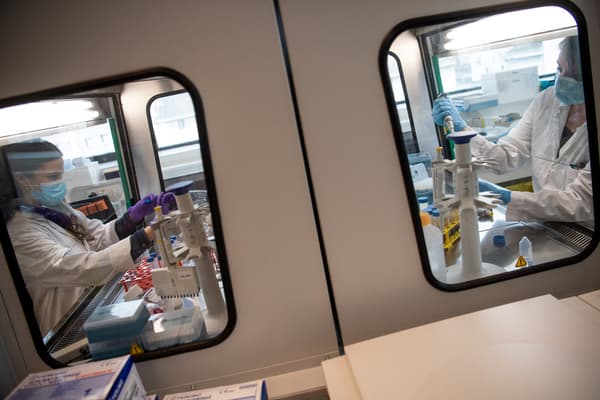A new bearer of hope. The French biotechnology company OSE Immunotherapeutics, based in Nantes, presented positive results on Monday for its therapeutic vaccine Tedopi for patients with advanced lung cancer.
This “really opens great doors and great hopes for all our patients living with cancer,” Fabrice Barlesi, general director of the Gustave Roussy Institute and lung cancer specialist, told Franceinfo.
• A vaccine to gain time to live
We should have no illusions: the vaccine will not eradicate lung cancer, the third most common and first cause of cancer death in France, according to the National Cancer Institute.
“In vaccination, there are two main technologies,” summarizes Nicolas Poirier, CEO of OSE Immunotherapeutics, at the BFMTV microphone. “The best-known, prophylactic, preventive vaccination, which was used in the context of the pandemic or other types of infections, and therapeutic vaccination.”
It is therefore a vaccine to treat the disease and not to prevent it. Tedopi was designed to intervene in the “third line”, that is, when patients have been previously treated, without success, with chemotherapy and immunotherapy, when they have relapsed and have no other therapeutic alternatives.
Result: patients who participated in the clinical trial and received the vaccine gained time in life.
“One year after the start of treatment, 44.1% of these patients were still alive in the group that received the vaccine, compared to only 27.5% in the chemotherapy group,” according to the results published in the journal Annals of oncology.
According to other figures, patients survived an average of three and a half months longer. Half of the patients live more than 11.1 months with the vaccine, compared to 7.5 months for the others.
Vaccinated people also saw their risk of death decrease by 41% compared to other patients.
“It may seem modest. But life has another price when you are sick,” says Professor Benjamin Besse, director of clinical research at the Gustave-Roussy Institute and principal investigator of the trial called Atalante-1, in the newspaper. The world.
Especially because patients not only save time but “above all, good time,” Nicolas Poirier, general director of the company, insists to the newspaper.
In fact, the vaccine allows you to benefit from a better quality of life because the side effects are fewer. Only 11% of vaccinated patients had side effects compared to 35% of those who underwent chemotherapy.
Adverse effects that also differ. With vaccination, “we can have local reactions to the targets of the injection, which are a sign of inflammation, of the immune system response,” observes Nicolas Poirier, interviewed by BFMTV. Chemotherapy causes fatigue, nausea, vomiting, hair loss, etc.
Not all lung cancer patients are compatible with this Tedopi vaccine. It is aimed at people with an advanced stage of “non-small cell” cancer, the most common cancer related to smoking, and who have metastases (half of the patients with this cancer).
“In addition, a bit like when we do a transplant, we are obliged to check the levels of compatibility between the donor and the recipient,” Fabrice Barlesi, general director of the Gustave Roussy institute, explains to Franceinfo.
And he adds: “We need to identify a subgroup of patients who have the appropriate biological characteristics to respond to the vaccine.” Therefore, people must have a certain genetic profile called HLA-A2, as is the case with almost half of the population.
As mentioned above, the vaccine also only applies to people with recurrence who have already received chemotherapy and immunotherapy.
According to Nicolas Poirier, director of OSE Immunotherapeutics, 100,000 people are affected each year worldwide.
• “Reeducate the system to do its job”
This therapeutic vaccine aims to train the immune system to recognize and fight cancer cells.
“A functioning immune system eliminates tumor cells. So, by definition, when we have metastatic cancer, it is because our immune system has gone astray, the tumor has been able to develop resistance. Therefore, we must reeducate the system to do so” . work,” explains Nicolas Poirier.
To do this, through a biopsy, researchers isolate specific proteins, called antigens, on the patient’s cancer cells. They then program the immune system so that these antigens become the target of T lymphocytes, white blood cells that play a crucial role in the immune system.
“There are small parts on the surface of tumor cells that are different from healthy cells. Once our white blood cells are trained to recognize these foreign cells, they can eliminate them when they patrol,” explains the CEO of OSE Immunotherapeutics.
For this vaccine to be effective, the 139 affected patients – of the 219 participants from nine European countries and the United States – received an injection every three weeks, on six occasions. Then every eight weeks for a year, before being spaced out to twelve weeks.

• There will be no marketing before 2027
The study published in the journal Annals of oncology reports results from a phase 3 trial, the pre-marketing stage. However, due to Covid-19, “the study did not complete its recruitment” and therefore “does not have the desired power,” said Benjamin Besse.
A new trial should be carried out at the beginning of 2024, with a cohort of more than 300 people, “to confirm the published results,” says Nicolas Poirier. This “confirmatory” study will cover three years and, if the results are positive, “a possible registration in 2027 and then commercialization.”
This new trial will also be an opportunity to study second-line patients “to restart treatment.” “From now on, immunotherapy is given with chemotherapy in the first line, when patients fail, they reach second line. This is where there is a great medical need,” explains the general director of Ose Immunotherapeutics.
• One of the most advanced vaccines
Scientific advances in vaccines are increasing. Last December, the Moderna and Merck laboratories reported positive preliminary results of their messenger RNA vaccine, in development, against a type of skin cancer, melanoma. When taken in combination with an anti-cancer drug, it reduces the risk of cancer recurrence or death by 44%.
A few months later, in spring, the BioNTech and Roche laboratories published promising results for patients suffering from pancreatic cancer. Although the study was carried out on a very small cohort (only 16 patients), half had developed an immune response thanks to a vaccine.
In June, another French company, Transgene, designed a vaccine to prevent the recurrence of cancers affecting the otorhinolaryngeal sphere. Of the 16 patients treated, none relapsed more than 10 months after the injection.
OSE Immunotherapeutics’ Tedopi vaccine is the most advanced. And it could even be applied later to other cancers, such as skin and pancreatic cancer. “It is certain that we will have results in these diseases in the coming months and years,” says Fabrice Barlesi. 2023 seems to be a year of hope for the fight against cancer.
Source: BFM TV


